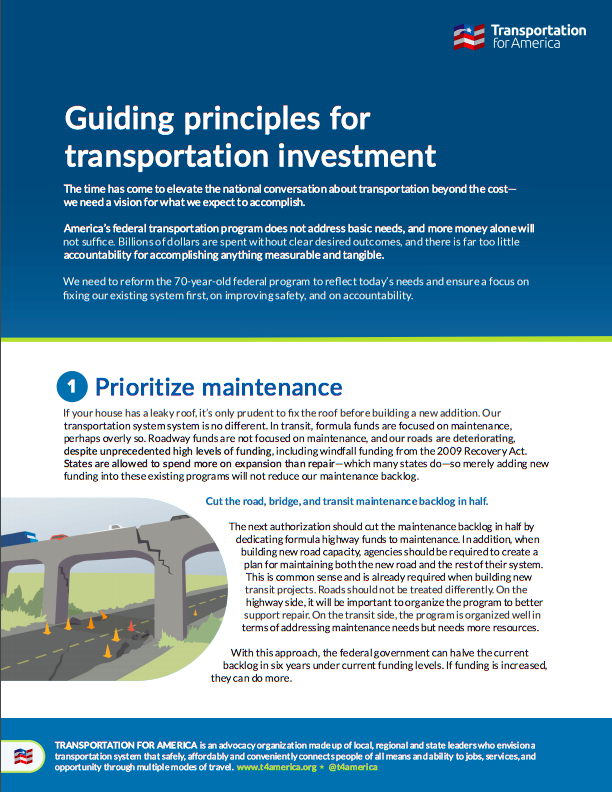SOTU followup: Does transportation offer a glimmer of bipartisan hope?
As we noted in our statement after the State of the Union address Tuesday night, it was good to hear the President again cite the need to steer new revenue toward “rebuilding our roads, upgrading our ports, unclogging our commutes”. He didn’t say much beyond that, of course, but given other developments in the background, we have reason to be somewhat encouraged.
Cities are “laboratories of innovation.” Should they have more control of transportation funding?
That was the implied assertion made by Atlanta Mayor Kasim Reed in a widely-circulated op-ed last week on Huffington Post. But is it accurate to paint today’s debate over this point as a black-and-white “age-old tug of war between state transportation officials and their city-level counterparts” about doling out money, as National Journal did in a question to their panel of transportation experts? Or is the problem more that we’re entering a new age of transportation needs armed with the last era’s transportation policies?
Statement in response to President Obama’s call for transportation investment in the State of the Union address
Responding to President Obama’s call to steer new revenue toward “rebuilding our roads, upgrading our ports, unclogging our commutes”, Transportation for America Director James Corless issued this statement.
Our Can-Do Places series continues: Denver
Faced with potential employers suggesting that the lack of transit connections were preventing Denver from realizing their economic development goals, the region’s leaders banded together and made a bold bet on an ambitious and comprehensive plan to expand their transportation network a decade ago.
Graphic: Comparing the 2014 bipartisan budget to 2013
Congress passed the first full budget in three years last night after the Senate vote that will provide stable or increased funding for key programs we’ve been fighting for over the last few years. Take a look at this graphic which shows the good news for transportation in this 2014 budget compared to FY2013 figures post-sequestration.
Transportation for America congratulates Congress on adopting a 2014 budget with solid funding for transportation
Responding to House and Senate adoption of a comprehensive 2014 federal budget, Transportation for America Director James Corless issued this statement:
Reaction to transportation investment levels in the compromise federal budget bill for fiscal 2014
Proposal increases funding support for locally driven solutions Responding to release of the omnibus bill covering all federal discretionary spending for FY2014 – drafted in accordance with December’s House-Senate budget agreement — Transportation for America Director James Corless issued this statement: “We are very pleased to see that the omnibus bill gave appropriate weight to preserving […]
Cuts restored, progress possible in critical budget deal
Positive news from Congress today! Yes, you heard right. Just months after budget sequestration and a government shutdown put transportation funding at risk, House leaders have agreed to a budget deal that would provide stable or increased funding for key programs that you’ve helped us defend over the last few years.
In 2013, 20-plus states took up transportation funding: Here’s the final tally
With a large number of state legislatures convening as the new year gets underway, it’s worth a look back at an important trend from 2013: States stepping forward to raise additional money for transportation. With federal funding remaining flat in 2012′s transportation bill (MAP-21) and after years of deferred action during the long recession, a large number of states, metro areas and local communities moved to supplement federal dollars with new revenues of their own.
T4 brings mayors to Washington to tell Secretary Foxx about the importance of passenger rail
T4America brought together a group of mayors to visit with U.S. Secretary of Transportation Anthony Foxx — a former mayor himself — and deliver a message about the importance of passenger rail to the economies of those communities they represent.





